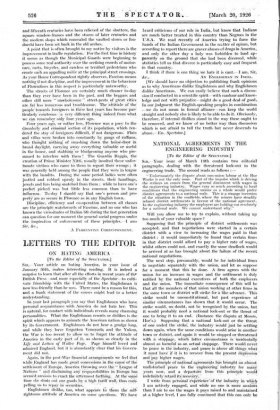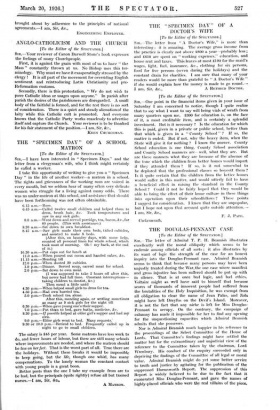NATIONAL AGREEMENTS IN THE ENGINEERING INDUSTRY [To the Editor of
the SPECTATOR.]
Sra,—Your issue of March 13th contains two editorial paragraphs, dealing with the threatened lock-out in the engineering trade. The second reads as follows :—
" Unfortunately the 'dispute abont non-union labour at the Hoe Works is not the only issue. Part of the. impulse Which is driving the strikers on comes from the general discontent with wages in the engineering industry. Wages vary so: much according to local Conditions that the engineering unions as a whole would 'prefer district agreements to a national scale. This is a strange inversion of the situation in the coalfields, where the miners have steadily refused district settlements in favour of the national agreement. In the engineering industry the employers are holding out resolutely for a- national scale. We cannot understand why."
Will you allow me to try to explain, without taking up too much of your valuable space ?
Supposing that the principle of district settlements was accepted, and that negotiations were started in a certain
district with a view to increasing the wages paid in that district ; it would immediately be found that certain firms in that district could afford to pay a higher rate of wages, whilst others could not, and exactly the same deadlock would be arrived at as has brought about the failure of the recent national negotiations.
The next step, presumably, would be for individual firms to negotiate separately with the union, and let us suppose for a moment that this be done. A firm' agrees with the union for an increase in wages and the settlement is duly ratified by the national executives of both the employers and the union. The immediate consequence of this will be that all the members of that union working at other firms in the same town or district will strike fora like advance. --This strike would be unconstitutional, but past experience of similar circumstances has shown that it would occur. The strike would, no, doubt, not he "recognized by the union, but it would probably need a national lock-ont or the threat of
one to bring it to an end. (Instance the dispute at Messrs.
Hoe's.) Supposing that a national lock-out or the threat of one ended the- strike; the industry would just be settling down again, when the same conditions would arise in another town or district, and again it would be stopped or threatened with a stoppage, which latter circumstance is - theidentallY almost as harmful' as an actual stOppage. There would rieiier be peace in the industry, and peace is above all what it must 'have if it is to recover` froth the present CiepiesSion and pay higher wageS.
The principle of national his brought an almost
undiSturbed -Peaee to the -engineering industry for many years now and a departifie from this principle would indefinitely retard itsjiecoVery:' write I Write from personal "experience' of the one in Which
I am actively engaged, and while no one is more anxious than I air to see the wages it pays raised to and maintained at a higher level, I am fully convinced that this can only be brought about by -adherence to the principles of national agreements.—I am, Sir, &c.,
ENGINEERING EMPLOYER.



























































 Previous page
Previous page